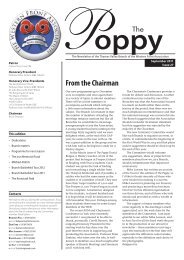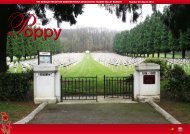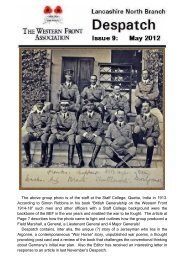east_kent_winter_ 2012.pdf - The Western Front Association
east_kent_winter_ 2012.pdf - The Western Front Association
east_kent_winter_ 2012.pdf - The Western Front Association
You also want an ePaper? Increase the reach of your titles
YUMPU automatically turns print PDFs into web optimized ePapers that Google loves.
pictures in the living room, and there are books everywhere. Howard’s long-suffering wife Anne knows that<br />
wherever he goes he is on the lookout for more items, and she often notices that the collection of bayonets on<br />
the wall seems to have grown overnight. Howard showed members a German helmet and a British helmet<br />
acquired on his first trip to France. Other items included a memorial sword for Rudyard Kipling’s son John,<br />
an Australian bayonet with hooked quillon, and a WWI service revolver used by G C Heseltine at Gallipoli.<br />
Howard spent eight years researching and writing a 600 page tome <strong>The</strong> Great War Medal Collectors’<br />
Companion with colour illustrations. <strong>The</strong> book covers many aspects relating to the medals – including<br />
practical information on buying, storing and cleaning, and a chronology of all the battles of the Great War.<br />
<strong>The</strong>re are the campaign medals such as the Stars, the British War Medal, the Victory Medal and Mercantile<br />
Marine Medal, and the Memorial Plaques. <strong>The</strong>re are also the gallantry medals such as <strong>The</strong> Victoria Cross, the<br />
Distinguished Service Order, the Military Cross and the Distinguished Conduct Medal. <strong>The</strong>re will be a second<br />
volume of <strong>The</strong> Great War Medal Collectors’ Companion at some stage. It will include more detail, such as<br />
information about the 8,000 or so abbreviations found on First World War medals.<br />
<strong>The</strong> Great War Medal Collectors’ Companion costs £60 from the author via email:<br />
howard@williamson2844.fsnet.co.uk<br />
Howard’s ongoing project is to produce a Roll of Honour of the 115,000 recipients of the Military<br />
Medal and publish it in book form by 2014. In 1996 Howard and fellow enthusiast Chris Bate<br />
learned that the wartime index cards kept at the MoD were to be destroyed. National Archives staff<br />
had only copied the fronts of these cards so it was vital that these records were saved as most of the<br />
citations had been burnt to a cinder when enemy action destroyed a warehouse in the City of London<br />
during the Blitz. Chris and Howard took home 40 boxes of cards. Approximately 9,000 cards had<br />
citations or other data on the back. Not all medal-holders are recorded on the cards, but they all<br />
appear in the London Gazette. Chris has a complete set of London Gazettes for the period, so he’s<br />
working through Howard’s list to verify awards, add missing names and make corrections. LP<br />
In November the Branch welcomed back John Derry who spoke very eloquently for over an hour about Field<br />
Marshal Sir Douglas (later Earl) Haig. Haig commanded the British Expeditionary Force (BEF) from 1915 to the<br />
end of the War. He was commander during the Battle of the Somme, the Third Battle of Ypres, and the<br />
Hundred Days Offensive, which led to the armistice in 1918.<br />
Haig’s part in WW1 was controversial at the time and still divides historians today. Haig’s most extreme critics<br />
accuse him of being an incompetent butcher, responsible for sending thousands of men to unnecessary<br />
deaths. More recently historians have taken a more lenient view of Haig’s strategy in WW1 and portray him as<br />
one of the great British commanders. When “Reconsidering Haig” John argued that Winston Churchill was more<br />
generous in his attitude to Haig than Lloyd George, who was vitriolic in his condemnation. In his book World<br />
Crisis written during Haig's lifetime, Churchill called him a surgeon acting dispassionately for the long-term<br />
good of the patient, no matter how messy the short-term means. He conceded later that Douglas Haig was a<br />
man in the classic mode and doubted whether any other commander would have had the fortitude, courage<br />
and integrity to secure a British victory. Churchill also suggested that Haig and his staff failed to make the<br />
most imaginative use of the military technologies available during the war. Most historians including Brian<br />
Bond accept now that under Haig the British army on the <strong>Western</strong> <strong>Front</strong> pushed the available military<br />
technology to its limits, especially in 1918. Lloyd George in his War Memoirs described Haig as "intellectually<br />
and temperamentally unequal to his task" and criticised Haig for lacking the personal magnetism of a great<br />
commander, and for his intrigues against his predecessor Sir John French. Liddell Hart, military historian,<br />
accused Haig of being a man of supreme egoism and utter lack of scruple.<br />
Critics of Haig suggest that, largely owing to Haig’s stance and that of Sir William Robertson, Chief of the<br />
Imperial General Staff 1915–1918, the British concentrated their efforts on the <strong>Western</strong> <strong>Front</strong> and failed to take



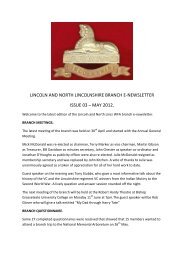
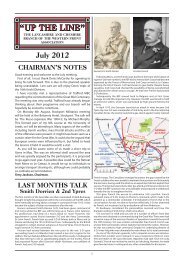


![Fromelles Australian Working List[1].pdf - The Western Front ...](https://img.yumpu.com/29972632/1/184x260/fromelles-australian-working-list1pdf-the-western-front-.jpg?quality=85)
